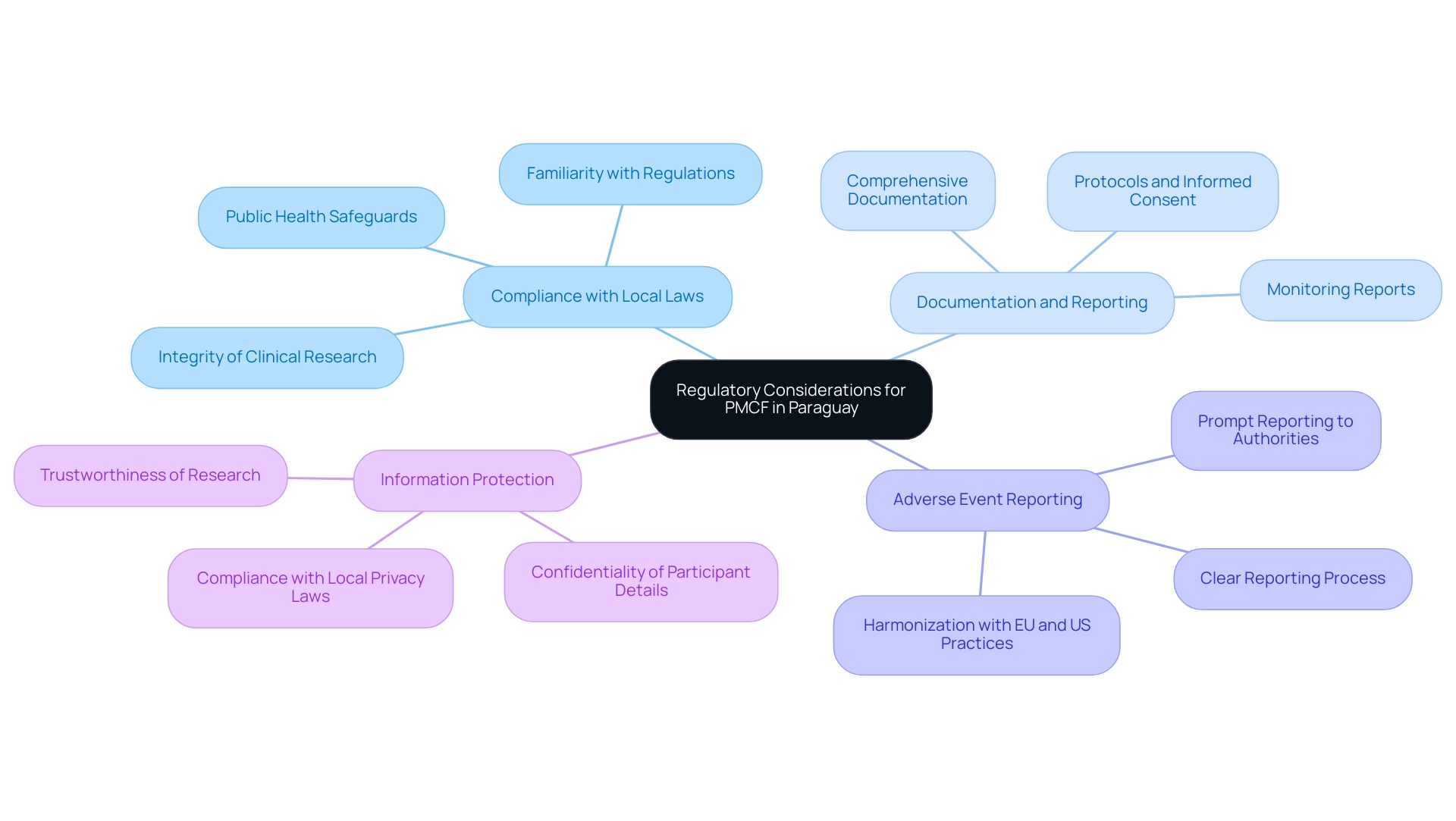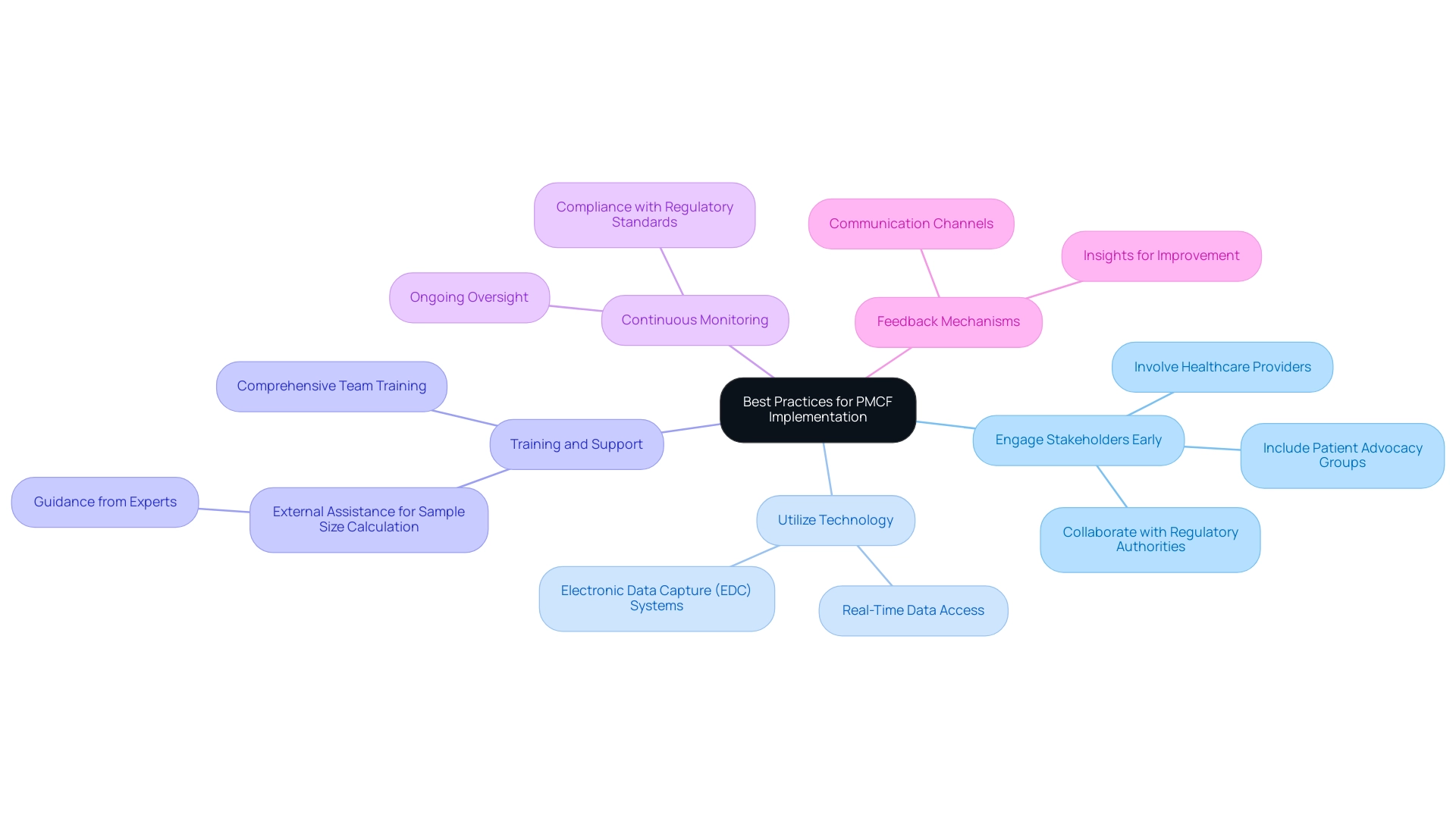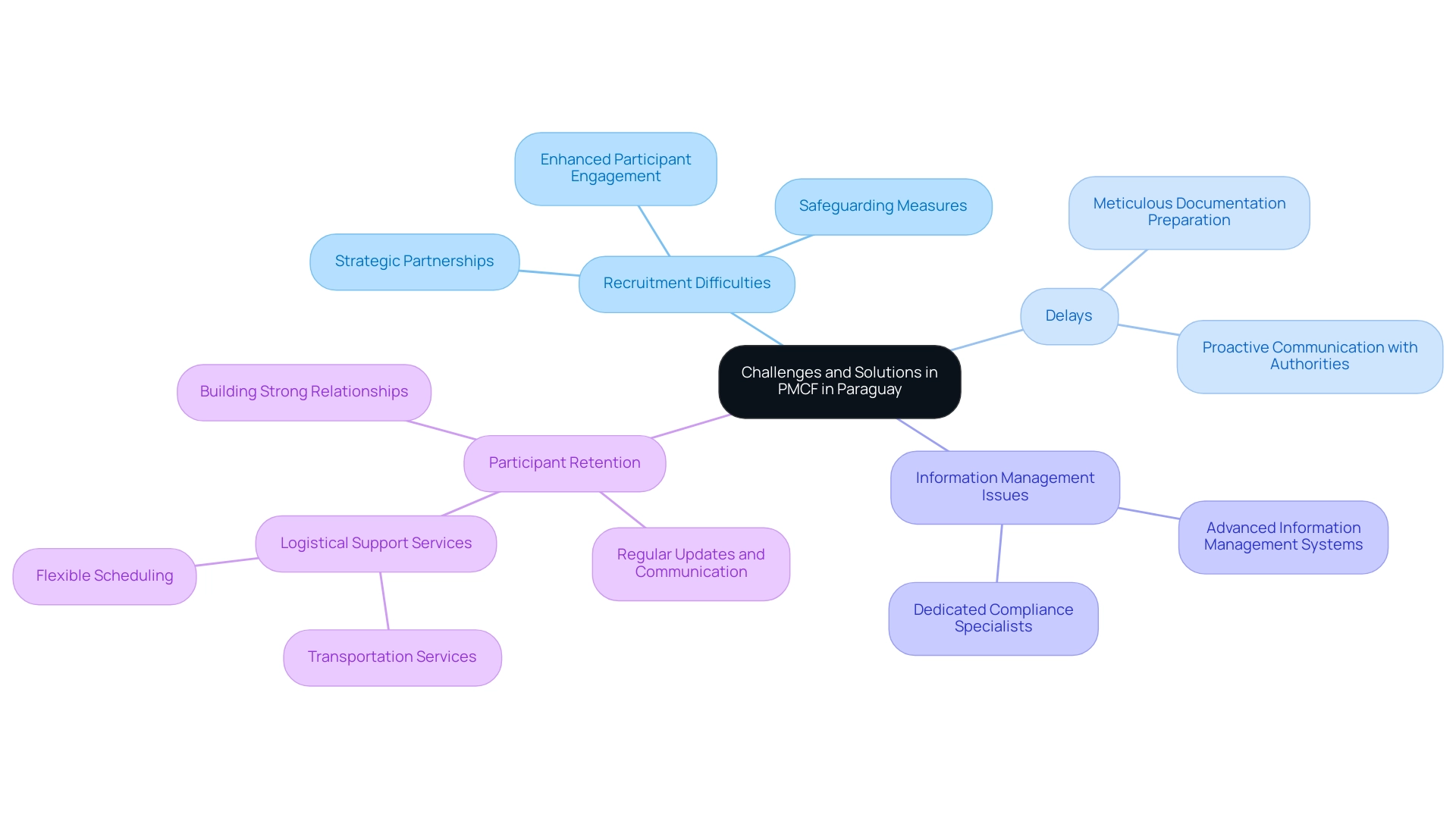Introduction
In the realm of medical device regulation, Post-Market Clinical Follow-Up (PMCF) serves as a cornerstone for ensuring ongoing safety and effectiveness after a product reaches the market. In Paraguay, this essential process is governed by national health authorities that align with stringent international standards, reflecting a commitment to safeguarding public health. As the demand for advanced medical technologies grows, the importance of robust PMCF practices becomes increasingly evident.
This article delves into the intricacies of conducting PMCF in Paraguay, exploring the systematic steps required, regulatory considerations, best practices, and the challenges faced by researchers. By understanding these elements, stakeholders can navigate the complexities of PMCF, ultimately contributing to enhanced patient safety and improved medical outcomes in a rapidly evolving healthcare landscape.
Understanding Post-Market Clinical Follow-Up in Paraguay
Post-Market Clinical Follow-Up is essential in the lifecycle of medical devices, acting as a required process by governing bodies to guarantee the continued safety and effectiveness of devices after market launch. In Paraguay, the Post-Market Clinical Follow-Up is regulated by national health authorities that align with international standards set by organizations such as the World Health Organization (WHO) and the International Organization for Standardization (ISO).
The primary objective of these studies is to gather comprehensive data regarding the performance of medical devices in real-world settings. This monitoring enables manufacturers to observe long-term health outcomes and identify any adverse events occurring post-usage. Such proactive measures not only guarantee adherence to regulations but also boost public confidence in the safety and effectiveness of medical technologies.
As Paraguay experiences a growing need for advanced medical technology, the application of strong Post-Market Clinical Follow-Up practices becomes increasingly essential for facilitating effective patient care. The local healthcare market is evolving, and with it, the necessity for stringent post-marketing clinical follow-up processes that are in line with international standards. However, Medtech firms encounter obstacles such as compliance challenges, language barriers, and resource fragmentation that complicate the execution of these studies.
Moreover, the anticipated revenue of the medical technology market in the United States, estimated at US$211.10bn in 2024, highlights the global importance of Post-Market Clinical Follow-Up in Paraguay and reinforces the need for similar practices in emerging markets. A practical example of successful Post-Market Clinical Follow-Up in Paraguay can be observed through Freyr, which employs strategic local health authority connections and a proactive consulting approach. This combination of local expertise and global compliance knowledge greatly improves manufacturers' ability to adhere to region-specific legislation and guidelines, highlighting the crucial role of Post-Market Clinical Follow-Up in Paraguay within the evolving medical technology landscape.
Moreover, metrics from successful post-market clinical follow-up efforts indicate that such practices can lead to a 30% reduction in adverse event reporting timelines, showcasing their effectiveness in enhancing device safety and efficacy.

Step-by-Step Process for Conducting PMCF in Paraguay
Carrying out assessments for Post-Market Clinical Follow-Up in Paraguay necessitates a systematic approach that guarantees adherence to regulatory standards while protecting participant welfare. Here are the key steps to follow:
- Define Objectives: Establish clear, specific goals for the PMCF research, focusing on critical information and outcomes such as device performance, safety, and user satisfaction.
- Develop a Research Protocol: Formulate a comprehensive research protocol detailing the methodology, participant selection criteria, data collection techniques, and statistical analysis strategies. This protocol must align with local regulations and adhere to ethical guidelines. Recent insights from Bassil Akra, CEO and Co-Owner of QUNIQUE, presented at the Virtual MedTech: EUMDR Exchange Conference, 2021, emphasize the importance of a well-structured protocol in navigating the complexities of PMCF.
- Obtain Ethical Approval: Submit the research protocol to an ethics committee for thorough review and approval. This step is essential for ensuring that the research meets ethical standards and protects the rights of participants. Federica Turriziani Colonna, a medical device regulatory consultant, notes that manufacturers should consider both the value and the potential challenges related to generating real-world evidence (RWE) for PMCF purposes.
- Recruit Participants: Identify and recruit participants who meet the established inclusion criteria. This process may involve collaboration with healthcare providers or institutions that utilize the medical device.
- Gather Information: Carry out the information collection process in line with the research protocol. It is essential to collect information systematically, ensuring that all relevant details are accurately documented.
- Examine Information: Following the completion of information gathering, perform a comprehensive evaluation to assess the research results. Employ appropriate statistical methods for interpreting the results, ensuring robust findings. The success of post-market clinical follow-up efforts depends on choosing the appropriate platforms for carrying out these analyses to ensure data quality, usability, and reusability, as shown in registry analyses and Patient Reported Outcomes (Pros).
- Report Findings: Create a detailed report summarizing the post-market clinical follow-up study findings. This report should be submitted to regulatory authorities and may also be published to enhance the overall body of medical knowledge.
- Implement Changes: Should any safety concerns or performance issues emerge during the post-market clinical follow-up, engage with stakeholders to implement necessary changes or corrective actions to address these challenges. An ideal post-market clinical follow-up plan should reflect the general and specific methods of post-market clinical follow-up activities and align with clinical evaluation and risk management documentation.
By adhering to these structured steps and leveraging the expertise of bioaccess®—with over 20 years of experience in Medtech and a focus on feasibility assessments, site selection, and project management—researchers can ensure a compliant and effective approach to conducting Post-Market Clinical Follow-Up in Paraguay. This not only strengthens the ongoing safety and efficacy of medical devices available in the market but also emphasizes the accelerated nature of bioaccess®'s clinical research services.

Regulatory Considerations for PMCF in Paraguay
In Paraguay, conducting Post-Market Clinical Follow-Up research necessitates strict compliance with the frameworks established by national health authorities. Key considerations include:
-
Compliance with Local Laws: Familiarizing yourself with the laws governing clinical research and medical devices in Paraguay is crucial, particularly the requirements outlined by the Ministry of Health.
These regulations are designed to safeguard public health and ensure the integrity of clinical research. The emphasis on Post-Market Surveillance (PMS) further underscores the importance of thorough monitoring and compliance in these studies.
-
Documentation and Reporting: Researchers must prepare and maintain comprehensive documentation, including protocols, informed consent forms, and monitoring reports, in accordance with local regulations.
Accurate documentation is crucial not only for adherence to regulations but also for ensuring the validity and reliability of the findings. Our extensive experience in managing various studies, including PMCF, Early-Feasibility Studies (EFS), First-In-Human Studies (FIH), Pilot Studies, and Pivotal Studies, equips us to assist researchers in this regard.
-
Adverse Event Reporting: Establishing a clear and efficient process for reporting adverse events is essential.
Prompt reporting to the appropriate authorities, as required by compliance standards, helps ensure participant safety and supports oversight. Effective reporting mechanisms are integral to maintaining public trust in medical devices. The unique methods of the EU and US in adverse event reporting further highlight the significance of harmonization and best practices in compliance.
Information Protection: Adherence to information protection regulations is essential to ensure the confidentiality and security of participant details throughout the clinical follow-up process.
Guaranteeing that personal information is managed in line with local laws not only safeguards participant privacy but also boosts the trustworthiness of the research.
By thoroughly grasping and following these compliance aspects, researchers can effectively maneuver through the intricacies of Post-Market Clinical Follow-Up in Paraguay, ensuring adherence and the successful implementation of their projects. Utilizing the knowledge of specialists such as Katherine Ruiz, a seasoned regulatory affairs expert, can further streamline this process and enhance the overall management. Our service capabilities also encompass feasibility assessments, site selection, trial setup, and project management, which are essential for the smooth execution of clinical trials.

Best Practices for Successful PMCF Implementation
To enhance the success of Post-Market Clinical Follow-Up (PMCF) studies in Paraguay, it is essential to implement several best practices, leveraging the comprehensive clinical trial management services provided by bioaccess®, which boasts over 20 years of experience in the Medtech industry:
-
Engage Stakeholders Early: Actively involving key stakeholders—such as healthcare providers, regulatory authorities, and patient advocacy groups—fosters alignment and support from the outset. Their insights can significantly influence the project's objectives and methodologies, ensuring that they address the real-world needs of patients and practitioners.
-
Utilize Technology: The adoption of advanced technology in information collection and management is crucial for improving efficiency and accuracy. Implementing electronic data capture (EDC) systems can streamline data entry and facilitate real-time access to information, ultimately enhancing the integrity of the research.
-
Training and Support: Comprehensive training for all team members involved in the project is vital. Ensuring that each participant understands their roles, responsibilities, and the importance of compliance fosters a culture of accountability. As noted by Jón Ingi Bergsteinsson, co-founder of Greenlight Guru Clinical,
Sample size calculation should not be treated lightly, and we strongly recommend utilizing external assistance for guidance when possible.
This is especially important in Post-Market Clinical Follow-Up in Paraguay research, where precise sample size determination is critical for ensuring the validity of results.
-
Continuous Monitoring: Ongoing oversight of the research process is necessary to promptly identify and address any issues. This proactive approach helps maintain compliance with regulatory standards, ensuring that the study remains aligned with its goals. Notably, the Post-Market Clinical Follow-Up in Paraguay should run continuously throughout the entire lifecycle of a medical device, reinforcing the need for sustained oversight.
-
Feedback Mechanisms: Establishing robust feedback mechanisms for participants and stakeholders is critical. These channels not only enable communication but also offer valuable insights that can highlight areas for improvement, thereby enhancing the overall quality of the process.
Integrating insights from the case analysis titled 'Practical Guide to PMCF Plan under EU MDR' can further inform best practices, outlining essential elements for a compliant plan, including methods, objectives, and timelines. By following these best practices and employing bioaccess®'s extensive service capabilities—such as feasibility and selection of research sites, compliance reviews, trial setup, import permits, and project management—researchers can significantly enhance the effectiveness and efficiency of their Post-Market Clinical Follow-Up in Paraguay, contributing to advancements in medical knowledge and patient safety. This commitment aligns with the continuous nature of post-market clinical follow-up activities throughout the lifecycle of a medical device, supported by the expertise and customized approach of bioaccess®.

Challenges and Solutions in Conducting PMCF
Conducting post-market clinical follow-up (PMCF) studies in Paraguay presents several significant challenges that can impact the study's success:
- Recruitment Difficulties: Identifying eligible participants often poses a significant hurdle. To enhance recruitment efforts, forming strategic partnerships with healthcare providers is crucial, as they can help identify potential participants and streamline the recruitment process. Safeguarding measures in recruitment messages can also alleviate participant concerns and build trust. For instance, in a recent collaboration with bioaccess®, GlobalCare Clinical Trials (GCCT) successfully reduced subject recruitment time by over 50%, showcasing the effectiveness of these strategies in enhancing participant engagement.
- Delays: The oversight landscape in Paraguay can introduce delays in obtaining necessary approvals. Researchers must ensure meticulous preparation of documentation and timely submissions, coupled with proactive communication with oversight authorities to minimize setbacks. Thorough preparation is critical, as statistics indicate that regulatory delays can significantly extend timelines.
- Information Management Issues: Handling extensive sets of information can be overwhelming, particularly regarding compliance and accuracy. Implementing advanced information management systems and possibly hiring dedicated specialists can maintain integrity and facilitate smoother operations throughout the research.
- Participant Retention: Engaging participants throughout the research duration is critical for maintaining data integrity. Regular updates and open lines of communication can make participants feel valued and informed, essential for retention. As highlighted in case analyses, including GCCT's collaboration with bioaccess®, developing robust relationships and providing logistical assistance, such as transportation services and adaptable scheduling, can greatly enhance retention rates, particularly among lower-income groups. By explicitly linking these strategies to participant retention challenges, researchers gain a better understanding of their importance.
To further enhance the execution of Post-Market Clinical Follow-Up in Paraguay, bioaccess® provides a comprehensive range of services, including feasibility assessments, site selection, compliance reviews, trial setup, import permits, project management, and reporting. Nicola Armitstead, Vice President of Site Clinical Operations, emphasizes the significance of a comprehensive approach, stating, "At MAC, we are committed to addressing these obstacles, and our comprehensive strategy helps ensure efficient recruitment and retention, enabling us to meet and exceed the needs of clinical trials while accelerating study timelines and bringing therapies to participants sooner." By proactively addressing these challenges with strategic solutions, researchers can enhance the likelihood of successful Post-Market Clinical Follow-Up in Paraguay.

Conclusion
Post-Market Clinical Follow-Up (PMCF) is an essential process that ensures the ongoing safety and effectiveness of medical devices in Paraguay. As outlined, PMCF is governed by strict regulatory frameworks that align with international standards, highlighting the commitment of local health authorities to public health. The systematic approach to conducting PMCF, from defining objectives to implementing necessary changes, reinforces the importance of thorough data collection and analysis in understanding device performance in real-world settings.
Moreover, the article emphasizes the significance of best practices and stakeholder engagement throughout the PMCF process. By leveraging technology, providing comprehensive training, and establishing robust feedback mechanisms, researchers can enhance the efficiency and effectiveness of their studies. Although challenges such as recruitment difficulties and regulatory delays exist, strategic solutions can mitigate these issues, ensuring that PMCF studies are executed successfully.
In conclusion, the implementation of rigorous PMCF practices is vital not only for compliance but also for fostering public trust and improving patient outcomes in the medical technology landscape. By embracing a proactive and structured approach, stakeholders can navigate the complexities of PMCF in Paraguay, ultimately contributing to safer and more effective medical devices that align with the evolving needs of healthcare.
Frequently Asked Questions
What is Post-Market Clinical Follow-Up (PMCF) and why is it important?
PMCF is a necessary process in the lifecycle of medical devices that ensures their continued safety and effectiveness after market launch. It involves monitoring devices in real-world settings to gather data on their performance and identify any adverse events, thereby boosting public confidence and regulatory compliance.
How is PMCF regulated in Paraguay?
In Paraguay, PMCF is regulated by national health authorities in alignment with international standards set by organizations like the World Health Organization (WHO) and the International Organization for Standardization (ISO).
What are the primary objectives of PMCF studies?
The primary objectives of PMCF studies are to collect comprehensive data on medical device performance, monitor long-term health outcomes, and identify any adverse events that occur after device usage.
What challenges do Medtech firms face when conducting PMCF in Paraguay?
Medtech firms encounter challenges such as compliance issues, language barriers, and resource fragmentation, which complicate the execution of PMCF studies.
What are the key steps involved in conducting PMCF in Paraguay?
The key steps include defining objectives, developing a research protocol, obtaining ethical approval, recruiting participants, gathering information, examining the data, reporting findings, and implementing changes based on the results.
Why is compliance with local laws essential for PMCF in Paraguay?
Compliance with local laws ensures public health protection, the integrity of clinical research, and adherence to the requirements set by the Ministry of Health, which are crucial for the successful execution of PMCF studies.
What role does documentation play in PMCF studies?
Comprehensive documentation is vital for regulatory adherence, ensuring the validity and reliability of research findings, and maintaining participant safety through informed consent and monitoring reports.
How can technology improve PMCF studies?
Utilizing advanced technology, such as electronic data capture (EDC) systems, can enhance efficiency and accuracy in data collection and management, thereby improving the integrity of research.
What are some best practices for successful PMCF in Paraguay?
Best practices include early stakeholder engagement, utilizing technology, providing training and support, continuous monitoring, and establishing feedback mechanisms for participants and stakeholders.
What are some significant challenges faced during PMCF studies in Paraguay?
Challenges include recruitment difficulties, delays in obtaining approvals, information management issues, and participant retention throughout the study duration.
How can researchers address recruitment difficulties in PMCF studies?
Researchers can enhance recruitment by forming strategic partnerships with healthcare providers, using effective communication to build trust, and implementing safeguards in recruitment messages.
What services does bioaccess® offer to facilitate PMCF studies in Paraguay?
Bioaccess® provides a range of services including feasibility assessments, site selection, compliance reviews, trial setup, import permits, project management, and reporting to support the execution of PMCF studies.

